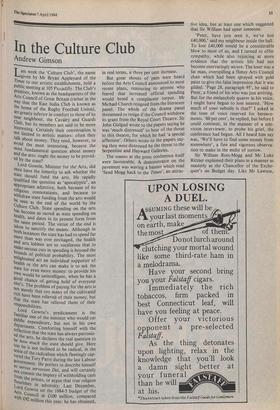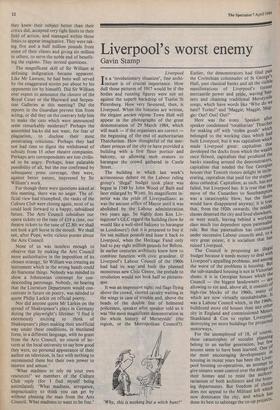In the Culture Club
Andrew Gimson
Last week the 'Culture Club', the name given by Mr Bryan Appleyard of the Times to our artistic establishment, held a
Public meeting at 105 Piccadilly. The Club's premises, known as the headquarters of the Arts Council of Great Britain (rather in the way that the East India Club is known as the home of the Rugby Football Union), are greatly inferior in comfort to those of its near neighbour, the Cavalry and Guards Club, but its members are said to be more interesting. Certainly their conversation is not limited to artistic matters: often they talk about money. They tend, however, to avoid the most interesting, because the most fundamental question about money and the arts: ought the money to be provid- ed by the state?
Lord Gowrie, Minister for the Arts, did once have the temerity to ask whether the state should fund the arts. He rapidly qualified the question as 'apocalyptic', an appropriate adjective, both because of its religious connotations, and because to withdraw state funding from the arts would be seen as the end of the world by the Culture Club. State spending on the arts has become as sacred as state spending on health, and dates in its present form from the same period. The virtue of the end is taken to sanctify the means. Although in both instances the state has had to spend far more than was ever envisaged, the health and arts lobbies are so vociferous that to Make serious cuts in spending is beyond the bounds of political probability. The most enlightened act an individual supporter of health or the arts can make is to ask the state for even more money: to provide his own would be unintelligent, when he has a good chance of getting hold of everyone else's. The problem of paying for the arts is not merely that too many of the cultivated rich have been relieved of their money, but that the state has relieved them of their responsibilities. _ Lord Gowrie's predicament is the familiar one of the minister who would cut Public expenditure, but not in his own department. Comforting himself with the reflection that the state has always patronis- ed the arts, he declares the real question to be how much the state should give. Here too he is not inclined to be radical, in the sense of the radicalism which fleetingly cap- tured the Tory Party during the last Labour government. He prefers to describe himself as servus servorum Dei, and will certainly not Commit the impiety of withholding cash from priests, or argue that true religion nourishes in adversity. Last December, L. ord Gowrie set the 1984-5 budget of the Arts Council at £100 million, compared with £92 million this year: he has obtained,
in real terms, a three per cent increase. But great shouts of pain were heard before the Arts Council announced its most recent plans, reassuring to anyone who feared that increased official spending would breed a complacent torpor. Mr Michael Church resigned from the literature panel. The whole of the drama panel threatened to resign if the Council withdrew its grant from the Royal Court Theatre. Sir John Gielgud wrote to the papers saying he was 'much distressed' to hear of the threat to this theatre, for which he had 'a special affection'. Others wrote to the papers say- ing they were distressed by the threat to the Serpentine and Hayward Galleries.
The omens at the press conference itself were favourable. A demonstrator on the pavement was waving a banner which read `Send Mogg back to the Times', an attrac-
tive idea, but at least one which suggested that Sir William had upset someone.
`Peter, have you seen it, we've lost £40,000,' said my neighbour inside the hall. To lose £40,000 would be a considerable blow to most of us, and I turned to offer sympathy, while also rejoicing at more evidence that the artistic life had not become enervatingly secure. The loser was a fat man, overspilling a flimsy Arts Council chair which had been sprayed with gold paint to give the false impression that it was gilded. 'Page 28, paragraph 95', he said to Peter, a friend of his who was just arriving. But for the melancholy quaver in his voice, I might have begun to lose interest. 'How much of your subsidy is that?' I asked in the tone of voice reserved for bereave- ments. '60 per cent', he replied, but before I could continue, in the manner of a tele- vision interviewer, to probe his grief, the conference had begun. All I heard him say was, 'We'll have to find some money from somewhere', a fine and vigorous observa- tion to make in the midst of sorrow.
Sir William Rees-Mogg and Mr Luke Rittner explained their plans in a manner as masterly as the Chancellor of the Exche- quer's on Budget day. Like Mr Lawson, they knew their subject better than their critics did, accepted very tight limits to their field of action, and managed within those limits to appear imaginative. They were tak- ing five and a half million pounds from some of their clients and giving six million to others, to serve the noble end of benefit- ing the regions. They invited questions.
The magnificent skill of Sir William at defusing indignation became apparent. Like Mr Lawson, he had been well served by the exaggerated stories put about by his opponents (or by himself). Did Sir William ever expect to announce the closure of the Royal Court or the Hayward and Serpen- tine Galleries at this meeting? Did the reports in the Guardian prevent him from acting, or did they on the contrary help him to make the cuts which were announced seem remarkably moderate? Perhaps the assembled hacks did not want, for fear of plagiarism, to disclose their most penetrating criticisms. Perhaps they had not had time to digest the withdrawal of subsidy from 15 other theatre companies. Perhaps arts correspondents are too civilis- ed to be angry. Perhaps, least palatable possibility of all, but the one confirmed by subsequent press coverage, they were, against better nature, impressed by Sir William's work.
For though there were questions asked at this meeting, there was no anger. The of- ficial view had triumphed, the ranks of the Culture Club were closing again, most of us could look forward to a happy, subsidised future. The Arts Council subsidises our opera tickets to the tune of £19 a time, our theatre tickets to the tune of £2.80: we shall not look a gift horse in the mouth. We shall not, after Pope, write vicious poems about the Arts Council.
None of us was tasteless enough to observe that by making the Arts Council more authoritative in the imposition of its chosen strategy, Sir William was creating an instrument which in the wrong hands could do fearsome things. Nobody was minded to show a Johnsonian contempt for con- descending patronage. Nobody, on hearing that the Literature Department would con- centrate in future on poetry, was minded to quote Philip Larkin on official poetry.
Nor did anyone quote Mr Larkin on the spread of Shakespeare's plays in Germany during the playwright's lifetime: 'I find it enormously exciting to think of Shakespeare's plays making their unofficial way under these conditions, in mutilated form, in a different language, with no grant from the Arts Council, no course of lec- tures at the local university to say how good they were, no personal appearance of their author on television, in fact with nothing to recommend them but their own power to interest and amuse.'
'What madness to rely on your own resources!' we members of the Culture Club reply (for I find myself being assimilated). 'What madness, arrogance, impracticality to think you can get by without pleasing the man from the Arts Council. What madness to want to be free.'











































 Previous page
Previous page